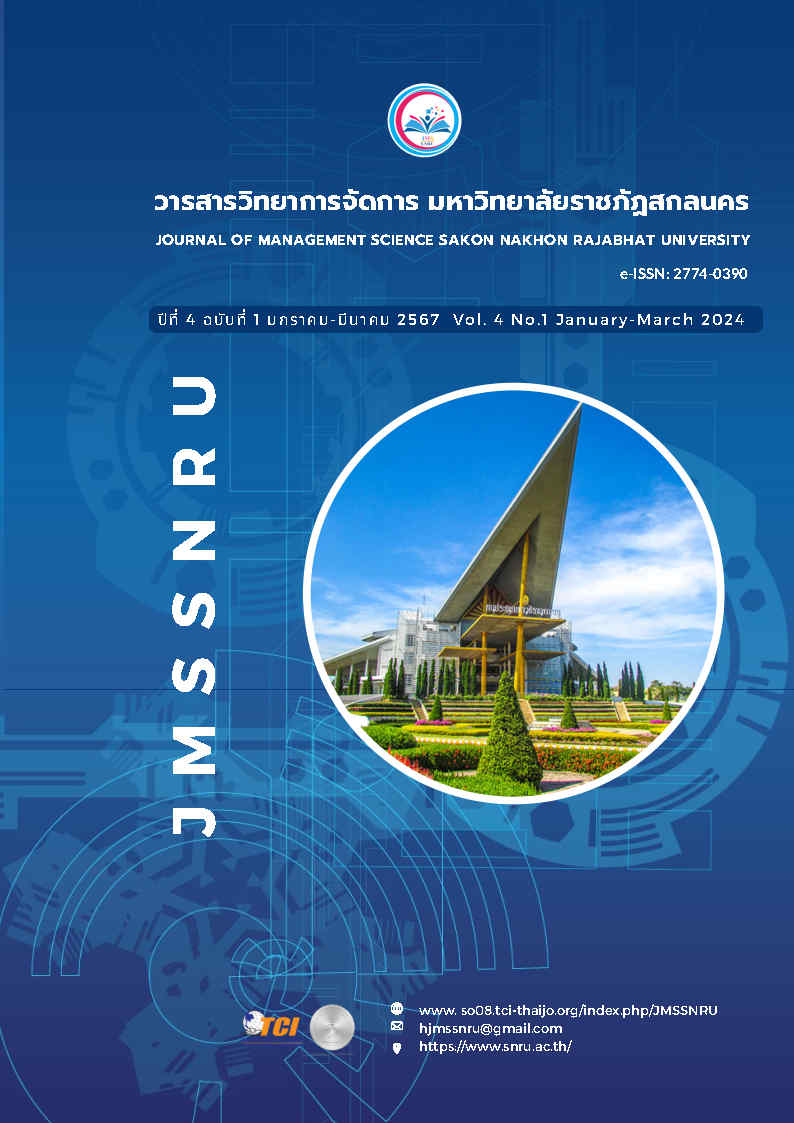SITUATIONAL LEADERSHIP OF SCHOOL ADMINISTRATORS UNDER UDON THANI SECONDARY EDUCATIONAL SERVICE AREA OFFICE
Keywords:
Situational leadership, School administratorAbstract
The purpose of this research study were to study the level of leadership according to the situation and guidelines for developing leadership according to the situation of school administrators under the Udon Thani Secondary Educational Service Area Office. The population is divided into 63 schools. The informants were 310 teachers. The tools used in the research including questionnaires and interviews. It has a precision value between 0.67 and 1.00 and a confidence value of 0.91. Data were collected using the Google Forms program and received a response of 91.72 percent. To analyze the data, the researcher used frequency, percentage, mean, and standard deviation. and content analysis. The results of the research found that: 1. Leadership level according to the situation of school administrators under the Udon Thani Secondary Educational Service Area Office. The overall picture was at a high level. There was little distribution. Every aspect was at a high level. The side with the highest average was selling ideas, followed by participation. and work assignment form. The aspect with the least average value was the command style. 2. Guidelines for developing leadership according to the situation of school administrators under the Udon Thani Secondary Educational Service Area Office included: school administrators should provide opportunities for teachers to planning their work. The school's expectations should explain or communicate to teachers. Executives should clearly explain the details of the work that they want their subordinates to do. Administrators should provide opportunities for teachers to participate, express their opinions on their work and involve teachers in setting goals. Executives should encourage subordinates to be willing to perform assigned duties to the best of their abilities.
References
กระทรวงศึกษาธิการ. (2559). หลักสูตรแกนกลางการศึกษาขั้นพื้นฐาน พุทธศักราช 2560. กรุงเทพฯ: ชุมนุมสหกรณ์การเกษตรแห่งประเทศไทย.
ชัยเสฏฐ์ พรหมศรี. (2557). ภาวะผู้นำร่วมสมัย. กรุงเทพฯ: ปัญญาชน.
ธนากร แก่นเกษ. (2560). ภาวะผู้นำเชิงสถานการณ์ของผู้บริหารโรงเรียนมัธยมศึกษาในจังหวัดจันทบุรี สังกัดสำนักงานเขตพื้นที่การศึกษามัธยมศึกษา เขต 17. สารนิพนธ์หลักสูตรการศึกษามหาบัณฑิต สาขาวิชาการบริหารการศึกษา มหาวิทยาลัยบูรพา.
ธร สุนทรายุทธ. (2556). พฤติกรรมเชิงการเมืองในองค์กร: จริตและจริยธรรมของคนองค์กรภาครัฐและเอกชน. (พิมพ์ครั้งที่ 1). กรุงเทพฯ: เนติกุลการพิมพ์.
ธัญพร ตันหยง. (2560). ได้ศึกษาวิจัยเรื่องการศึกษาบทบาทภาวะผู้นำตามสถานการณ์ของผู้บริหารสถานศึกษา สังกัดสำนักงานเขตพื้นที่การศึกษาประถมศึกษาจันทบุรี. วารสารรำไพพรรณี, 12(1), 52-53.
บุญชม ศรีสะอาด. (2560). การวิจัยเบื้องต้น. (พิมพ์ครั้งที่ 10). กรุงเทพฯ: สุวีริยสาส์น.
วิษณุกร แตงแก้ว. (2563). ภาวะผู้นำตามสถานการณ์ที่ส่งผลต่อประสิทธิผลในการบริหารงานบุคคลของโรงเรียนประถมศึกษา สังกัดสำนักงานเขตพื้นที่การศึกษาประถมศึกษาสุราษฎร์ธานี เขต 3. วิทยานิพนธ์ครุศาสตรมหาบัณฑิต สาขาวิชาการบริหารการศึกษา มหาวิทยาลัยราชภัฎสุราษฎร์ธานี.
วรรณพร ตรีชัยศรี. (2561). ความสัมพันธ์ระหว่างภาวะผู้นำตามสถานการณ์ของผู้บริหารสถานศึกษากับการเป็นองค์กรแห่งการเรียนรู้ของสถานศึกษาสำนักงานเขตพื้นที่การศึกษาประถมศึกษาสระบุรี เขต 2. วิทยานิพนธ์ศึกษาศาสตรมหาบัณฑิต สาขาวิชาการบริหารการศึกษา มหาวิทยาลัยเทคโนโลยีราชมงคลธัญบุรี.
สำนักงานคณะกรรมการการศึกษาขั้นพื้นฐาน. (2558). แนวทางการจัดกิจกรรมเรียนรู้ "ลดเวลาเรียน เพิ่มเวลารู้" ชั้นมัธยมศึกษาปีที่ 1-3.
สำนักงานเขตพื้นที่การศึกษามัธยมศึกษาอุดรธานี (2565). แผนปฏิบัติการประจำปี พ.ศ. 2565. อุดรธานี: กลุ่มบริหารงานบุคคล สพม.อุดรธานี ข้อมูล ณ วันที่ 1 พฤศจิกายน 2565.
Hersey, P.; Blanchard, K.H., and Johnson, D.E. (1996). Management of Organizational Behavior. (7th ed). Englewood Cliffs, NJ: Prentice-Hall.
Krejcie, R. V., & Morgan, D. W. (1970). Determining sample size for research activities. Educational and
Psychological Measurement, 30(3), 607-610.
Downloads
Published
How to Cite
Issue
Section
License
Copyright (c) 2024 JOURNAL OF MANAGEMENT SCIENCE SAKON NAKHON RAJABHAT UNIVERSITY

This work is licensed under a Creative Commons Attribution-NonCommercial-ShareAlike 4.0 International License.
An article published in the Journal of Management Science. Sakon Nakhon Rajabhat University is the opinion, copyright and responsibility of the author of the work.







